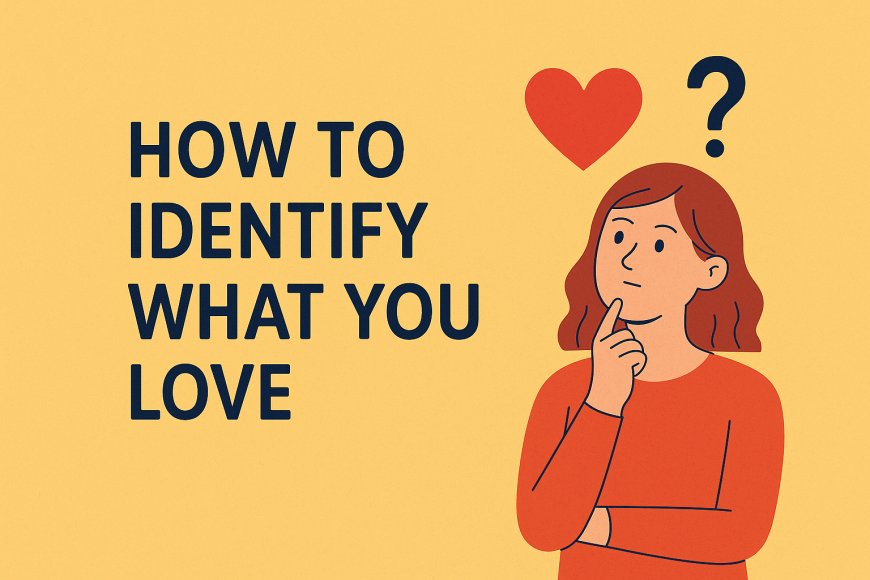How to Identify What You Love: A Practical Guide to Finding Your Passion
Struggling to discover your passion? This thoughtful guide offers practical insights into identifying what you truly love through self-awareness, introspection, and exploration—without pressure or perfection.

We all have that one friend who found their passion before they reached high school. They participated in an impromptu debate, created impressive structures using Lego blocks, or painted museum-worthy pieces using watercolor. From childhood, they knew what they loved to do. They pursued their passion, and their lives are happy and fulfilled.
Not all of us are that lucky. Maybe you wonder what it is like to have always known what you want to do; maybe you download every free self-discovery journal you find so you can discover your passion, or maybe your social media feed is filled with posts from life coaches that promise to help you find purpose and fulfillment when you buy their six-figure courses.
This guide was written for you. It is neither easy nor straightforward to identify what you love. You may fantasize about a dramatic moment, where a lightbulb flashes and your brain lights up because you have finally found your passion. You would leave your job, and spend your time and energy on something that drives you and gives you a reason to get out of bed in the morning.
The truth is far from that. Clarity comes over a period of time, not at once. It comes from activities already present in your life, the little things that speak deeply to you, but remain in the background disguised as daily habits, hobbies, favorite conversation topics, or personal obsessions. When you realize this, you understand that identifying what you love does not require searching outside; you need to look inward.
The pressure is not needed; you can drop it. Instead of allowing fear to rush you, you can take a step back. What you have to examine is your favorite subject, according to psychologists, which is yourself. You take some time out to get to know yourself: the topics you love to talk about, the things you do everyday even though you do not have to, the kind of content that captures your attention and fills your feed, the activities that make you forget time.
You should be aware of this common mistake. It is tempting to mix up your talent and your passion. Your talent is what you are good at; your passion is what you love and enjoy doing. For some people, their talent overlaps with their passion. For others, it does not. There is no ideal situation. Your talent will complement your passion, but they do not have to be the same. Maybe you are very good at solving math problems; if it does not energize you, it is not your passion.
Your focus in this exercise is not on the things you do so that others are pleased. Your concern is with the things you love so much, you do them because you can. The things you do joyfully even if you do not get paid. The topics that fill you with joy when they come up in a conversation or somebody asks you about. The activities that you get so absorbed in, you do not even notice that hours have gone by,
You might find that most of these things are not major or easily observed. They may be little or simple things, but they provide you with a sense of fulfillment. Maybe you make lists all the time, or you have a secret Ph.D. in pop culture, or you love calligraphy so much you would do it for free. Your tiny peculiar sources of joy are not just quirks; they are clues to help you identify your passion. You find them when you slow down and pay attention to yourself.
Being open to try new things is another strategy to find what you love. Explore new activities and places, alone or with friends; volunteer, take classes or bootcamps, contribute to fun projects, and learn more. You could find new hobbies or tasks that energize you or make you feel fulfilled. These new experiences could help you see clues to your passion you may have missed before. Remember to do this with an open mind, and not pressure to find your passion quickly.
There is another side to this. Some of us found a passion when we were younger or in a different stage of life. Things are different now, and you feel that you have outgrown that passion or that your previous interests do not align with who you are now. This is your reminder that you are not in a crisis. Growth is a healthy part of a normal life. Outgrowing old habits, interests, and passions are a sign that you are healthy. Do not be afraid to explore. Try out new things and find what energizes you.
When you identify what you love, you build confidence and increase your self-awareness. You are able to decide where to invest your time, energy, and resources to yield the desired results of fulfillment, happiness, and satisfaction. You live and function as the best version of yourself. Finding your passion is not a one-moment thing; it is a journey. The thing about life is you learn to love the journey, instead of just daydreaming about the destination.







